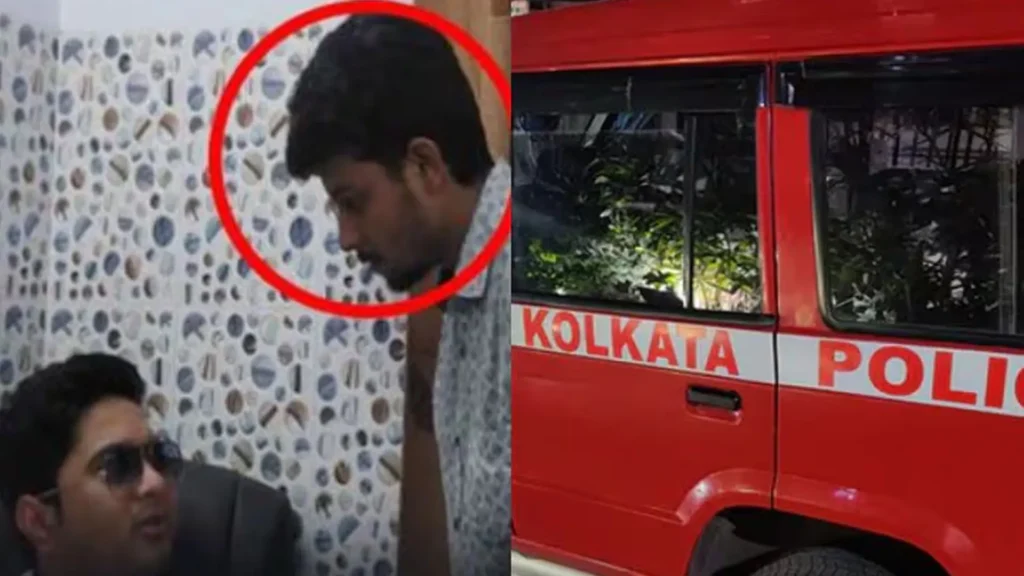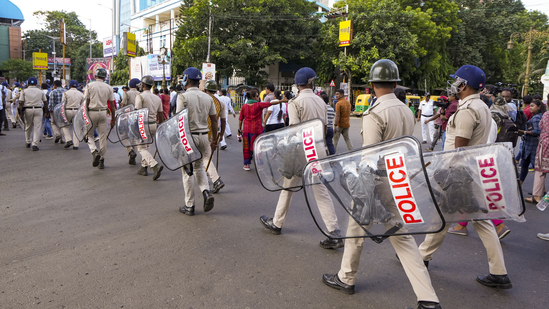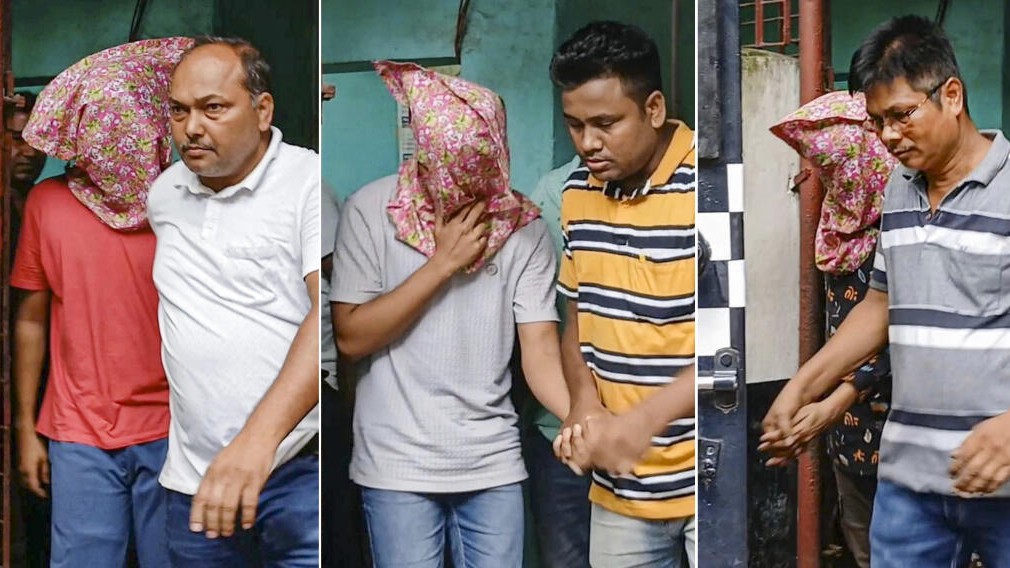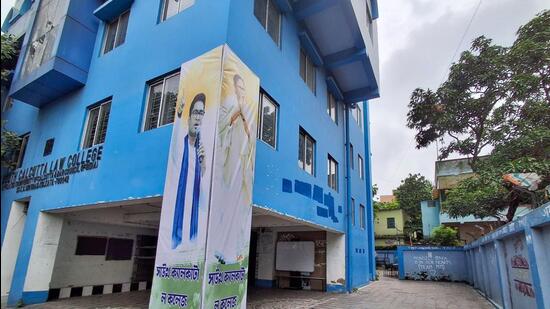
gang rape
Introduction
On June 25, 2025, a 24-year-old first-year law student at South Kolkata Law College was allegedly gang raped inside the campus premises. What makes this case especially shocking is the arrest of a college security guard, identified as Pinaki Banerjee (55), marking him as the fourth person held in connection with the crime .
This harrowing incident—allegedly carried out within the guard’s own room on campus—has ignited a fierce public debate about campus safety, institutional accountability, and the way power dynamics can be exploited in educational environments. It has also triggered a political uproar across West Bengal.
In this blog, we delve into every aspect of the case: from the timeline and legal developments to the broader societal and political implications. We also explore deeper issues of safety on educational campuses in India and what this incident reveals about systemic failures.

1. Chronology of the Crime and Arrests
Date and Location
- June 25, 2025: The alleged gang rape occurred in the security guard’s room inside the South Kolkata Law College premises in Kasba 1.
- The victim was reportedly visiting the college to submit a form for an upcoming exam
Sequence of Arrests
- June 26 (next day):
- Monojit Mishra (31) — a former student, contractual staffer, and ex-leader of the college’s Trinamool Congress Chhatra Parishad (TMCP)
- June 27:
- Zaib Ahmed (19), first-year student, and Pramit Mukherjee (20), second-year student
- June 28:
- Pinaki Banerjee (55), the long-standing on-duty security guard of the college, was arrested
2. Role and Negligence of the Security Guard – gang rape
Security guards are entrusted with the safety and security of the campus and its occupants. In this case, investigators allege a blatant failure of duty.
Key Allegations:
- The victim reported that Banerjee was present when the rape occurred but did not intervene, instead vacating his room on the assailants’ direction
- CCTV footage reportedly captured him loitering outside the guardroom during the assault .
- The police claim his statements were inconsistent and incoherent, failing to explain why he remained passive or left his post .
- The victim stated he was “made to sit outside” the room, implying complicity or coerced inaction
Possible Charges
Banerjee may face charges including:
- Criminal conspiracy and aiding the offenders.
- Neglect of duty and non-assistance to a person in danger, under various sections of the Indian Penal Code (IPC).
- Possible obstruction of justice for refusing to report the crime or providing false statements.

3. Profile of the Accused – gang rape
a. Monojit Mishra
- Age: 31.
- Former student and now staff member.
- Ex-president of the college’s TMCP chapter, and reportedly an organisational secretary of its southern Kolkata wing .
- Allegedly orchestrated the crime after the victim rejected his marriage proposal, and allegedly acted violently in retaliation
b. Students Zaib Ahmed and Pramit Mukherjee
- Both current law students, aged 19 and 20 respectively.
- Alleged participants who stood by and watched the assault without intervening .
c. Security Guard Pinaki Banerjee
- Age: 55.
- Stationed at the guardroom at the time of the incident.
- Allegedly negligent or complicit, failing to protect the victim in his capacity as a security professional.
4. Victim’s Testimony and Evidence
The Complaint
- The victim stated in her FIR that she was detained in the guardroom even after completing her paperwork submission, under the pretext of waiting for a “union post” offer by Monojit Mishra, who allegedly had influence
- She claimed that despite repeated pleas for help, the guard neither intervened nor alerted anyone
- She described being physically assaulted for over three hours—from about 7:30 pm to well past 10:30 pm—during which one of the accused reportedly filmed the attack
- According to her, Mishra said she’d threaten her by implicating her boyfriend or parents if she resisted .
Critical Evidence
- CCTV footage from inside and near the guardroom captured:
- Mishra and the students escorting the victim in.
- Banerjee standing outside and appearing to leave on instruction
- Forensic samples were collected from the site by a police team to match DNA evidence .
- The victim’s medical report is under review by police and judicial authorities .
5. Institutional and Security Failures – gang rape
a. Campus Safety Mechanisms
- A location within the guardroom should ensure safety, not enable crime. Yet, due to internal complicit behavior or neglect, the precautions failed catastrophically.
- The main gate of the college was reportedly locked at the time, which raises questions regarding:
- Who authorized the gate closure?
- Was it part of an official protocol or illicitly done to limit witnesses?
b. Political Influence and Power Imbalance
- Mishra’s position within the student wing of the ruling party (TMCP) raised concerns about:
- Bureaucratic inertia or fear of confronting politically connected individuals.
- The possibility that college authorities or Banerjee felt compelled or intimidated, allowing the crime to proceed unchecked
c. Trust Broken
The case highlights how spaces deemed safe—educational institutions—can be:
- Betrayals of trust to those in protective roles.
- Potential sites for exploiting positional authority and secrecy.

6. Public and Political Repercussions
Outrage and Protest
- The assault on a college campus sparked immediate outrage—students, activists, civic bodies, and women’s groups protested and demanded swift justice .
- The National Commission for Women (NCW) has formally taken cognizance of the incident
Political Fallout
- The BJP criticized the Mamata Banerjee-led West Bengal government, questioning the failure to ensure women’s safety
- The TMC has vowed “justice will be served,” though allegations persist that party-connected individuals may have influenced campus security or investigation
- Political tensions are escalating statewide, with the incident turning into a focal point of civic trust, institutional accountability, and party confrontation .
7. Legal Proceedings and Next Steps
Custody of Accused
- Monojit, Zaib, and Pramit have been provided police custody until July 1, 2025 after being produced before Alipore Court
- Banerjee’s case is still developing, with authorities expected to seek similar custody once the charge sheet is filed.
Legal Framework
The accused may be charged under:
- IPC Section 376-D (gang rape).
- IPC Section 34 (common intention).
- IPC Sections 109, 120B (abetment, criminal conspiracy).
- Sections related to failure to assist a person in danger (Section 51A, criminal negligence).
For Banerjee specifically: On gang rape
- Non-assistance, abandoning post, suppression of crime, aiding the offenders, and complicity in concealment or intimidation may all apply.
8. Deep Dive: Campus Safety in India
This incident underscores a broader, recurring issue: student sexual violence within educational institutions. Several alarming points emerge:
a. Patterns of Abuse
Other high-profile cases show a disturbing pattern:
- Demonstrated abuse of authority by staff or senior students.
- Lack of adequate complaint mechanisms and unequal handling of cases involving politically connected parties.
b. Security Personnel: Guardians or Gatekeepers?
- Campus guards are often seen as trustworthy or apolitical, yet they operate under contract with minimal oversight.
- Here, the guard was viewed not as a protector but a passive enabler, raising questions about:
- Proper training.
- Accountability structures.
- The ability to report misconduct even in politicized environments.
c. Institutional Protocols
Effective campus safety requires:
- Transparent access controls with documented authorization.
- Regular patrols, especially during after-hours.
- Real-time monitoring of CCTV with active surveillance—reviewed in real-time.
- Crisis protocols for students in distress, including emergency hotlines and rapid response.
In this location, those systems appear to have failed completely.
9. What Needs to Change: Policy and Cultural Measures
1. Strengthen Oversight of Safety Staff
- Mandatory background checks, regular training in first response, and secure reporting systems.
- Clear whistleblower policies that protect those who expose negligence.
2. Institutional Reforms
- Establish independent student‑faculty safety committees with regular audits.
- Embed 24/7 phone-based helplines for students in crisis, managed by trained counselors.
- Regular safety workshops integrated into college orientation and continuing education.
3. Technology-driven Monitoring
- Active CCTV monitoring in guardrooms and common areas.
- Use of panic buttons, emergency alarms, or mobile apps for immediate alerts.
4. Legal and Disciplinary Frameworks
- Speedy internal disciplinary processes, independent of police actions.
- Protocols for immediate suspension of accused individuals.
- Mandatory support services (medical, legal, psychological) for survivors.
5. Cultural Sensitization
- Mandatory gender‑sensitivity training for all staff and students.
- Encouraging a culture that recognizes sexual misconduct, not dismisses it.
10. Broader Implications for Society
Trust in Institutions
This incident erodes the public’s trust in educational institutions as safe spaces for learning and growth. It highlights how power dynamics within campuses can be manipulated to exploit and harm.
Political Influence on Crime
The alleged involvement of politically connected individuals underscores the risks of politics intertwined with campus spaces. When student politics turns into a vehicle for intimidation, the consequences can be violent and traumatic.
Urgent Reforms
There is now a growing call—for both government and educational authorities—to:
- Enforce tougher safety regulations.
- Ensure transparency, swift justice, and restoration of trust.
A National Conversation
Cases like the 2024 R G Kar doctor rape-murder incident and the Birbhum gang-rape sparked public outrage and reform. This incident joins a growing list of campus-based crimes that demand:
- Deeper legal reform.
- Community vigilance.
- A stronger push against patriarchal entitlement and institutional complacency.

Conclusion of gang rape in kolkata
The gang rape of a law student at South Kolkata Law College, with the addition of a security guard’s arrest, sends a chilling message about the dangers of unchecked authority and systemic negligence. It is a symptom of larger societal failures:
| Concern | Issue Highlighted |
|---|---|
| People in authority abusing roles | Misuse of trust by staff and students |
| Institutional failure | Lack of proactive security and oversight |
| Complicity due to power | Political influence inhibiting action |
| Need for systemic reform | Training, policy, tech-based vigilance |
| Breakdown of trust | Campus not perceived as a safe space |
gang rape -To honor the victim’s courage, it is essential to:
- Ensure swift, impartial trials.
- Implement long-term safeguards.
- Foster a culture of zero tolerance towards sexual violence.
Let this tragedy be a catalyst for meaningful reform and stronger protection of human dignity in every educational institution across India.



